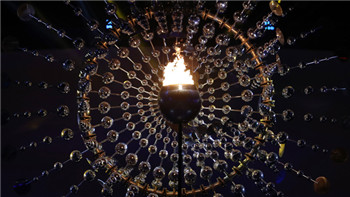
Last week, as Olympic fever gripped Brazil, I travelled to Rio de Janeiro to watch the opening ceremony. I found it an unexpectedly powerful and moving experience, not just because of the exuberant Brazilian music, joyous dancing and visual beauty but also because the event carried earnest political messages about national resilience, climate change and the need to protect refugees.
8月5日,当奥运会热潮席卷巴西时,我来到里约热内卢观看了开幕式。我发现这是一次意外震撼且打动人心的体验,不仅仅是因为热情的巴西音乐、欢乐的舞蹈和视觉美感,还因为这场盛会传递出了有关国家韧性、气候变化和保护难民的严肃政治信息。
There was another factor, however, that made the ceremony so memorable: it delivered spectacular digital visual effects, producing an immersive experience akin to sitting inside the Matrix or Insurgent movies. Over the course of several hours, a breathless kaleidoscope of computer images was beamed on to the walls and floor of the stadium, creating worlds of urban skyscrapers, seascapes and jungle scenes.
然而,还有一个因素让里约奥运会开幕式变得如此令人难忘:它呈现出了引人入胜的数字视觉效果,给人以类似置身于电影《黑客帝国》(Matrix)或《绝地反击》(Insurgent)中的浸入式体验。在短短几个小时的过程中,令人惊叹的电脑画面千变万化地投射在体育馆的墙壁和地面上,缔造出城市摩天大厦、海景以及森林景色的不同世界。
The net result was an experience as visually thrilling and emotionally powerful as anything I saw in the London 2012 opening ceremony (which I was lucky enough to attend) or Beijing’s, in 2008 (which I watched on television) — so much so that when the athletes finally stepped into the area, it was almost an anticlimax.
在视觉震撼以及情感力量方面,里约奥运会开幕式不亚于我在2012年伦敦奥运会开幕式(我有幸参加)或2008年北京奥运会开幕式(我在电视上观看)上的所见。这种感觉太强烈,以至于运动员最终入场时几乎令人扫兴。
In many ways, this is no surprise: most large events use computer projections these days. London 2012, for example, employed dazzling lighting. But the fact that digitisation now dominates the Olympic opening ceremony is a symbol of how our 21st-century world is changing.
从很多方面来讲,这并不令人意外:如今多数大型活动都使用电脑投影技术。例如2012年伦敦奥运会使用了令人眼花缭乱的灯光。但数字化现在主宰了此次奥运会开幕式,这表明我们所处的21世纪的世界正在发生巨大变化。
When I was a student, I was heavily involved in set design: I spent almost every spare minute inside theatre workshops, sawing wood, painting pieces of cloth and assembling scaffolding. It was a messy, physical job and my ambitions were constantly frustrated by gravity or the cost of moving scaffolding. At the Brazil event, the designers were liberated from gravity — the hard “work” was done with light beams and a computer mouse, not scaffolding. It was as if the set designers had been given cyber wings: they could switch scenes with a flexibility I could never have dreamt of — and at a far lower cost.
当我还是个学生时,我从事过很多与舞台设计有关的活动:我几乎一有空余时间就会跑到剧院工作室,在那里锯木头、给布料刷颜料,还组装脚手架。这是一份又脏又累的体力工作,重力或移动脚手架的成本总是让我的远大梦想受挫。在里约奥运会开幕式上,设计师们没有了重力的困扰,这份“累活”由光束和电脑鼠标完成,不需要脚手架了。舞台设计师似乎被插上了数字的翅膀:他们能够以我过去想都不敢想的灵活性转换场景,而且成本要低得多。
This partly reflected an artistic choice: Fernando Meirelles, the lead designer, is a renowned film-maker. It was also driven by expediency: the crisis-plagued government of Brazil was under pressure to keep costs down (and the budget for the Rio ceremony was reportedly less than half the £27m spent in London, and a small fraction of that spent in Beijing). But the key point is this: digitisation is giving designers more bang for their artistic buck; even — or especially — in cash-strapped emerging market nations such as Brazil.
这在一定程度上反映出了一种艺术选择:此次奥运会开幕式的主设计师费尔南多•梅里尔斯(Fernando Meirelles)是一位知名电影导演。它也是权宜之计的结果:受到危机困扰的巴西政府面临降低成本的压力(据报道,里约奥运会开幕式的预算不到伦敦奥运会所花费2700万英镑的一半,只是北京奥运会花费的零头)。但关键是:数字化让设计师获得更高的艺术性价比;即使(或者特别是)在巴西等资金紧张的新兴市场国家也是如此。
This is very cheering, particularly since it echoes a bigger pattern that cuts across the modern world. A few decades ago, anybody who wanted to attend an Olympic event had to either apply for tickets by mail or go to the venue itself — and they had to use paper maps to find their way there; it was a costly and time-consuming process.
这令人深受鼓舞,尤其是因为这与现代世界盛行的更广泛趋势一致。几十年前,想观看奥运会的人都必须要么通过邮件申请门票,要么亲自到赛场购票,他们还必须使用纸质地图找到通向赛场的路;这是一个昂贵且耗时的过程。
But last week in Rio, one thread that united the spectators — aside from an interest in sports — was that, irrespective of where they hailed from in the world, they all seemed to be clutching smartphones or tablets. These were used to navigate the city, book tickets, hail taxis, connect with friends, track the medal tally — or to post on social media.
但上周在里约,所有观众的一个共同点(除了对体育的兴趣)是,不论他们来自哪里,他们似乎都携带着智能手机或平板电脑。它们的用途是在里约导航、预订门票、叫出租车、与朋友联络、追踪奖牌榜或者在社交媒体上发布消息。
Local Brazilians were similarly engaged: whenever I hailed cabs, the taxi drivers not only used the maps on their phones to find venues and dodge the worst traffic, they used Google Translate to communicate with me, across the Portuguese-English language divide, with remarkable levels of “efficiency” — and low costs.
巴西当地人也有着类似的数字体验:每当我叫出租车时,出租车司机都会使用手机上的地图找到赛场并躲避拥堵路线,同时还使用谷歌翻译(Google Translate)与我交流,以惊人的“效率”和极低的成本跨过葡萄牙语和英语的鸿沟。
This digital power did not always circumvent all the real-world, human obstacles: there were still traffic jams, long security queues to enter events, confusing on-the-ground logistics, and so on. Nor could those computers remove the whiff of sewage that was a constant reminder that a few hundred metres away from some smart Olympic arenas, there were favelas where many people are so poor that they are excluded not only from this digital largesse but also from a properly maintained sewer system.
这种数字力量并不能总是规避所有真实世界的人为障碍:那里仍然存在交通拥堵、进入赛场前长长的安检队伍、令人困惑的地面物流等等。而且电脑也不能清除下水道的味道,这些味道不断提醒人们,在一些时髦的奥运场馆几百米开外,很多穷人还居住在贫民窟,他们不仅没有享受到这种数字技术带来的大量便利,而且还没有正常维护的下水系统。
But for those lucky enough to have digital power at their fingertips, the 2016 Olympic experience is a constant blend of the real world and cyber space, which echoes the opening ceremony in every sense. Digitisation is truly giving us wings. And the only thing that is more remarkable than this shift is that most of us now take this magic so completely for granted that we barely ponder it at all — not unless we think about how the world used to be experienced four, eight, 16 or 32 years ago, before humans started to love digital technology almost as much as their real-world sports.
但对于那些有幸动动手指就能掌握数字力量的人而言,2016年里约奥运会是一种真实世界与数字空间不断交织的体验,这种交织在方方面面与开幕式相呼应。数字化确实赋予了我们翅膀。唯一比这种变化更引人注目的是我们多数人现在把这种魔力完全视为理所当然,我们几乎根本不会深思,除非我们回忆一下4年、8年、16年或32年前,在人类开始像喜爱真实世界的体育那样喜爱数字技术之前,我们曾经怎样体验这个世界。












